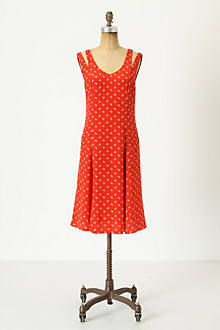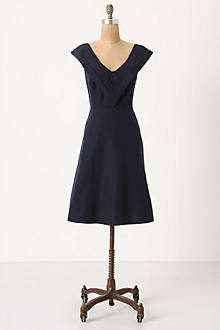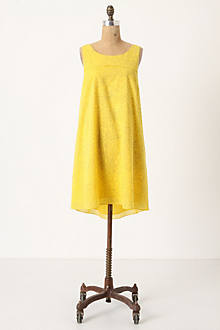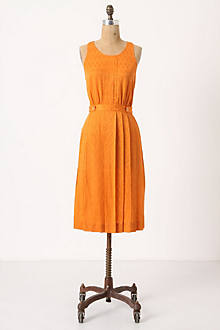
Sometime during the last week, I realized that to some extent, my No New Clothes practice had been about old-school renunciation: Avoid what is not not good. I was not doing things I usually do -- going to certain websites (my equivalent of a cigarette break at work), stopping off in certain stores. I've had success -- count: 1 new shirt (which I've already worn twice) -- and I felt I had some insight into why I turn to clothes shopping.
Would that insight hold up to field testing? Let's visit Anthropologie and see.
But first a recap: I'm not a hoarder or a fashionista. My habit's not out of control. But sometimes when I went shopping, clothes were not really what I was seeking. If I didn't buy something, I felt unhappy; if I did I felt guilty.
 So I sat with it. And I saw that sometimes when I was trying to get by buying clothes was a feeling of affirmation or admiration or validation. Sometimes I was looking for reassurance or attention, not green pants. (I still want green pants, btw.) And that had to do with the feeling that clothes could cover over the ways I felt that I was not enough -- could make me seem prettier, smarter, younger, whatever.
So I sat with it. And I saw that sometimes when I was trying to get by buying clothes was a feeling of affirmation or admiration or validation. Sometimes I was looking for reassurance or attention, not green pants. (I still want green pants, btw.) And that had to do with the feeling that clothes could cover over the ways I felt that I was not enough -- could make me seem prettier, smarter, younger, whatever.It helped a lot that I also was working in my practice with the Second Foundation of Mindfulness -- mindfulness of feeling tones. Is the sensation pleasant, unpleasant, or neither? One way to get away from unpleasant feeling tones was to go shopping.
So a couple of days ago I went into Anthropologie. Pretty things. Pretty colors. I tried some on; they just didn't quite work. There was one dress, bright yellow, simple, potentially useful. But when I tried it on, it turned out to be what in my youth was called a tent dress. (I don't think I need to explain.) It was not flattering.
 But it's yellow, my inadequacy said. It would be so much fun. You could have fun in this yellow dress.
But it's yellow, my inadequacy said. It would be so much fun. You could have fun in this yellow dress.I noted the unpleasant feeling tone. I noted the anxiety and insistence of my whiny self. I saw clearly that this dress would not lead to fun (at least more than another dress that would not fly up over my head in a breeze). This dress would not make me feel good in the long term. I left the store with no bags and a lightness of spirit.
This is pretty cool.
Do I think this will work every time? No. Will I simply wear the clothes I own because it's what's inside that counts and clothes merely fulfill a need for protection from the elements? Heck, no.
 How we present ourselves to the world is an expression of how we feel about ourselves. That doesn't mean that we wear Dior because we recognize our inherent richness. More likely the opposite -- we're using the clothes to prove that we are rich. It's not the specific item of clothing but the care you take with in wearing it that determines what it communicates.
How we present ourselves to the world is an expression of how we feel about ourselves. That doesn't mean that we wear Dior because we recognize our inherent richness. More likely the opposite -- we're using the clothes to prove that we are rich. It's not the specific item of clothing but the care you take with in wearing it that determines what it communicates.Are you wearing the dress or is it wearing you?
Chogyam Trungpa Rinpoche made his hippie followers wear suits and ties. How you dress can invoke upliftedness and grace. In the following quote he's talking about an apartment, but it easily could be clothing. If you feel good about your yourself, you take the time to look good, however, you define that, without stressing about it.
We are on this journey as a community. Read all the Responsible Consumption posts and follow along as we examine our habits.You can appreciate your life, even if it is an imperfect situation. Perhaps your apartment is run down, and your furniture is old and inexpensive. You do not have to live in a palace. You can relax and let go wherever you are. Wherever you are, it is a palace. If you move into an apartment that was left in a mess, you can spend the time to clean it up, not because you feel bad or oppressed by dirt, but because you feel good. If you take the time to clean up and move in properly, you can transform a dumpy apartment into an accommodating home. Chogyam Trungpa Rinpoche
No comments:
Post a Comment